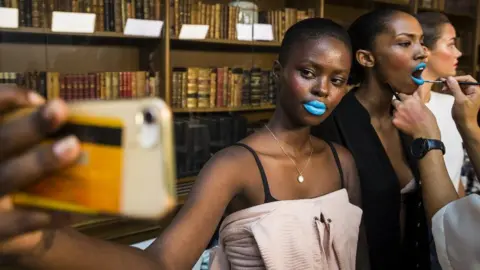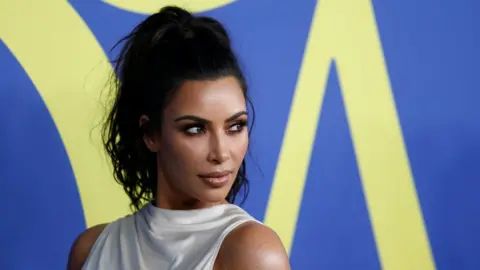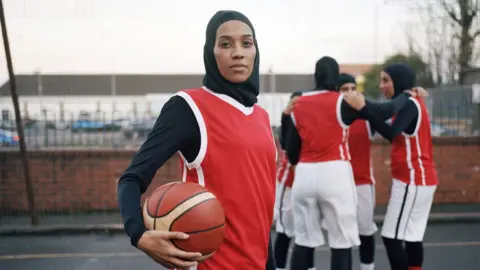#Instaperfect: Is inequality fuelling the rise of the sexy selfie?
 Getty Images
Getty ImagesJust as pictures are said to be worth a thousand words - it appears there is more to the humble selfie than is on the image.
The online obsession of our times has been equated with vanity and sometimes with gender oppression. But could it also be a behaviour driven by economics?
Asma Elbadawi is a British-Sudanese visual artist who thinks modern capitalism drives women to portray themselves as desirable objects.
She recently posted a selfie on Instagram with facial drawings resembling the markings a patient is given before plastic surgery.
 Asma Elbadawi/ Instagram
Asma Elbadawi/ InstagramOver the picture, she quoted a line from her latest poem, Shades, about "a world that creates insecurities then feeds them to its people".
Elbadawi, who is also a high-profile advocate for the empowerment of young Muslim girls, said she intended to use the language of billboards advertisements - an irony contrasting with the poem's anti-consumerist message.
"I noticed over the years that with the rise of social media and a drop in cosmetic surgery prices, women across the world have been changing their facial features to look more European as well as getting implants to extenuate their curves and chests," she told the BBC.
 Getty Images
Getty Images"I was constantly bombarded with images of 'perfect' sexy women and adverts trying to sell me slimming products and cosmetics," she says.
"Seeing this made me realise that in many ways capitalism is about creating insecurities through advertising in order to make profit from consumers - as well as making women dress and look a particular way for a male audience."
Not an object
Elbadawi's work raises an interesting question.
Decades of feminist achievements have enabled women to denounce anything that objectifies them, from anonymous catcalling to Hollywood's so-called casting-couch culture.
Yet the dissemination of social media, if anything, has meant we are more than ever bombarded with sexualised images of women seemingly happy to objectify themselves online. Why?
 Getty Images
Getty ImagesDr Khandis Blake is a psychologist at the University of New South Wales in Sydney, researching what female sexualisation can tell us about societies.
She tells the BBC that selfies are often taken as a sign of gender discrimination (women are taking them because they feel the need to appear attractive to men). But her latest research has also found an economic link.
In a paper published in the Proceedings of the National Academy of Sciences (PNAS) journal, Dr Blake describes her findings after an analysis of hundreds of thousands of selfies taken in 113 countries - which were then narrowed down to 68,562 "sexy" selfies.
The phenomenon of the sexy selfie is most prevalent in educated, developed countries, she says - the very societies where female empowerment has been greater.
 Getty Images
Getty Images"[They are ] the very same societies that have spent decades battling the sexual objectification of women and girls - and that are currently calling a string of powerful men to account for their behaviour to women."
To explain this apparent contradiction, her team looked at gender and economic indicators in those countries.
They found that women are more likely to invest time and effort into posting sexy selfies in places where economic inequality is on the rise.
That would explain why the US, the UK and Singapore - where income gaps are widening - are among the most addicted to selfies, together with a pocket of less developed, but much more economically unequal countries, like Brazil, Mexico and Colombia.
People in development countries with lower income inequality - like Norway, Sweden, Iceland and Denmark - took fewer "sexy" selfies.
Beauty market
 EPA
EPADr Blake says these conclusions are consistent with data from the real economy.
Women in areas of high income inequality in the US spend more in beauty salons and clothing stores, for example.
Elsewhere in emerging nations such as Brazil, Mexico and South Africa, the business of beauty exploded during the noughties economic boom.
But women investing more time and money in physical appearance doesn't correlate with female subordination, Dr Blake says.
Instead, she suggests, "sexualisation may be a marker of social climbing" and female competition.
Who's in control?
 Reuters
ReutersIt is a strategy that may suit some individuals. Kim Kardashian, the self-made reality TV star and cosmetic magnate, is now worth $350m according to Forbes. She has been called the most photographed woman in history.
Dr Blake says that looking attractive or sexy today "can generate large returns, economically, socially, and personally".
"Telling young women to stop posting sexy selfies is like asking them to forgo the pot of 'capital' youth bestows on them."
The problems arise when women are pressured into looking a certain way - the lack of choice is always disempowering, she says.
Asma Elbadawi, who also coaches, mentors and advises young girls playing basketball, worries about other effects as well.

She fears her pupils and their peers may never learn to "love themselves and their bodies".
"Young girls express the fear of growing muscles if they play a sport. In fact, some of their boyfriends tell them to stop playing so they don't hench (bulk) up. They feel this will make them less feminine and attractive."
It is a shame, Elbadawi says, because girls could learn a lot from an environment that is "about self-development and being in tune with your mind and body to perform at your best".
"But all these things are overlooked. Fitness instructors, fashion bloggers and make-up artists are followed in the millions because their focus is on getting the perfect bodies and looks."
